Whether your car is turbocharged from the factory or you’ve installed an aftermarket turbo kit, keeping it clean is the best way to ensure its longevity. The single biggest enemy of turbos is carbon deposits.
Leave your turbo neglected for long enough, and the soot built-up can sap a significant amount of power, or worse, seize the turbo altogether.
To avoid a turbo replacement, and to keep your boost levels consistent, it’s vital that you include cleaning your turbo in your car maintenance checklist.
Even if you have a check engine light that points you to turbo troubles, giving it a thorough clean might just save you from having to replace it. Luckily, there’s an easy way to clean your turbo before it gets so dirty.
In this article, we’ll explain why you should keep your turbo clean, how you can clean it, and list some of the best turbo cleaners available on the market.
Why You Should Keep Your Turbo Clean
Carbon buildup is the main reason why you might need to clean your turbo. Remember that a turbo is a form of forced induction and uses exhaust gases to push more air into your engine. Unfortunately, the exhaust gases contain particulates, hydrocarbons, and sometimes even oil.
What this means is that these contaminants have a good chance of accumulating on the turbo itself.
This can lead to problems with the turbo’s overall performance and may or may not be accompanied by a check engine light on your dashboard. If the check engine light is on, it is also likely your vehicle will go into limp mode, too, preventing you from driving too quickly/hard in order to protect the engine from severe damage.

Considering how expensive turbo replacement is and knowing how harmful carbon deposits can be, it makes sense to clean them periodically in order to prevent premature failure. While carbon buildup is unavoidable and will inevitably occur given the nature of the exhaust, certain conditions can aggravate the issue.
For example, if you regularly drive short trips, especially in stop-and-go traffic, the buildup of carbon and other contaminants is going to be worse than if you regularly drive on the highway at higher speeds.

This is because lower speeds and shorter drive duration prevent the buildup from being burnt off with the higher temperatures that come with driving faster. It’s one of the difficulties with daily driven supercars and other performance vehicles.
If this is your normal driving scenario, you will benefit from cleaning your turbo and might want to clean it more frequently than others who drive a lot of highway miles.
Even if you do a lot of highway driving or often push the car to its limit, your turbo could still use a good cleaning. While some carbon deposits might be burned off during periods of higher temperatures, you don’t want to assume there is no buildup at all and risk damage to your turbo.
Things To Know About Turbo Cleaners Before You Buy

The main thing to do when selecting a turbo cleaner is to make sure the one you buy is suited for the type of engine you have. Some are intended specifically for diesel engines while others are intended for gasoline engines. Others are fine to use on both types; just be sure to check the label and/or product description.
Additionally, there are two types of products:
- turbo cleaner sprays and
- pour-in additives.
The pour-in products are added directly to the fuel tank. There are also spray cleaners for both diesel and gasoline engines, but they require a little more work than the pour-in option as you have to spray at the inlet hose of the turbo itself.
Consult the factory service manual to find the location of your vehicle’s turbo and associated components if you are unsure where they are located on your specific make, model, and year.
Best Turbo Cleaners for Both Diesel and Gasoline Engines
Below is our list of the best turbo cleaners you can get for both diesel and gas engine turbocharged vehicles.
We list the type of engine each product works for so you know if it’s a safe cleaner for your car. If it is not designed or recommended for the type of engine you have, do not use it.
Archoil AR6400-D
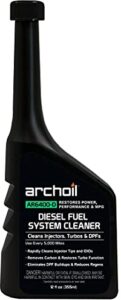
Manufacturer: Archoil
Part Number: FBA_AR6400-D
Quantity: 12 oz
Works for: Diesel engines
Buy on: Amazon
Archoil is one of the top brands when it comes to turbo cleaners. The AR6400-D is for diesel engines only and is perfect for the compound turbo setups that many of them employ.
This pour-in additive offers the extra benefit of being able to clean fuel injectors, along with emissions/exhaust components that are often subject to debris buildup—the exhaust gas recirculation (EGR) valve and diesel particulate filter (DPF). So you can clean your turbo as well as other vulnerable parts at one time.
Archoil’s AR6400-D 12 oz bottle is good for up to 40 gallons of diesel. It is recommended that owners use AR6400-D every 5,000 miles. This ensures buildup is minimized for the turbo and keeps the diesel engine running strong.
Archoil AR6400-G
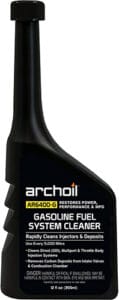
Manufacturer: Archoil
Part Number: AR6400-16-G
Quantity: 12 oz
Works for: Gasoline engines
Buy on: Amazon
The Archoil 6400-G is the gas engine counterpart to the 6400-D listed above. Like the 6400-D, this is a pour-in additive that cleans other components along with the turbo.
The 6400-G cleans EGR valves, intake valves, and fuel injectors, so the single product is able to tackle buildup throughout important parts of the engine.
A 12 oz bottle from Archoil is good for between 12 and 25 gallons of gas. Just like the diesel option above, it should be used every 5,000 miles to prevent buildup and ensure healthy engine operation.
Wynn’s 18753
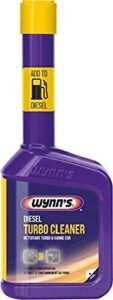
Manufacturer: Wynns
Part Number: 18753
Quantity: 11.5 oz
Works for: Diesel engines
Buy on: Amazon
Another top brand for turbo cleaners is Wynns; their 18753 is a diesel pour-in additive. For best results, Wynns recommends adding the product to 40 gallons of diesel, and repeating the process every 3rd tank of diesel.
Like the Archoil option, Wynns goes beyond just cleaning the turbo and also cleans EGR valves, helping reduce buildup in several places. This product can also be used if you have a biodiesel engine, as well.
Wynn’s 28679

Manufacturer: Wynns
Part Number: WYN28679
Quantity: 7 oz
Works for: Gasoline and diesel engines
Buy on: Amazon
The 28679 from Wynns is a spray turbo cleaner rather than a pour-in treatment. It will work for either diesel or gasoline engines.
The product must be sprayed at the inlet hose, which is located after the air filter but prior to the actual turbocharger itself. Be sure to check your service manual or consult other reputable resources before attempting this if it’s your first time.
As long as the turbo is working (not completely clogged), there is no need to dismantle it prior to spraying, meaning you can leave it as-is on the vehicle. The spray works to remove carbon, as well as other harmful contaminants like tar.
JLM Lubricants Diesel Turbo Cleaner

Manufacturer: JLM Lubricants
Part Number: J02380
Quantity: 16.9 oz
Works for: Diesel engines
JLM Lubricants is a premium brand that focuses on making professional-grade products that can be used by the DIYer, and their turbo cleaner is no exception.
The cleaner is a pour-in additive, and the bottle is good for a maximum of 18.5 gallons of diesel fuel. After this, you should deplete the fuel as much as possible in order to run the product through the system effectively.
It’s best to add the cleaner only when you have time to go for a long drive, and of course when your tank holds no more than 18.5 gallons of fuel.
Revive Diesel Turbo Cleaner Kit
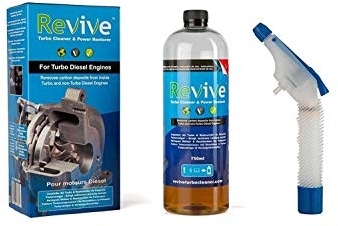
Manufacturer: Revive
Part Number: 1449-9000
Quantity: 25.4 oz
Works for: Diesel engines
Buy on: Amazon
Revive offers a kit instead of just the cleaner itself. The kit comes with the spray as well as a nozzle, and they take extra care to offer separate options for both gasoline and diesel engines, ensuring maximum effectiveness for the type of engine.
The Revive kit is meant to be used while the car’s engine is on. The spray contains particles that bind to the various build-up contaminants, which will then be carried away as the engine runs, exhausted out and leaving a cleaner turbo behind.
Another unique aspect of the Revive kit is that it is that it’s environmentally friendly, with a spray that is both biodegradable and non-toxic.
Revive Petrol Turbo Cleaner Kit
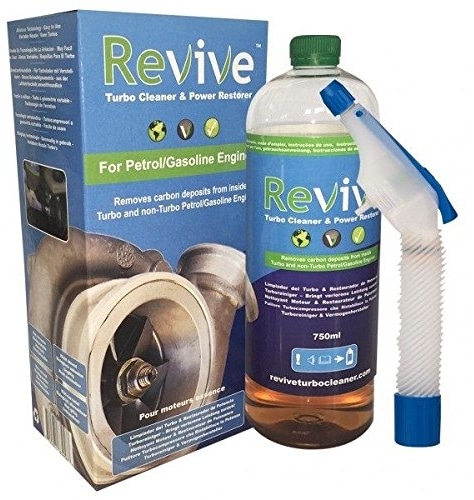
Manufacturer: Revive
Part Number: 1449-9400
Quantity: 25.4 oz
Works for: Gasoline Engines
Buy on: Amazon
The Revive kit for gasoline engines happens to have an identical manufacturer part number as the kit for diesel engines, so be sure to double-check the packaging prior to purchase to make sure you have the right one for your car.
It comes with the same nozzle and volume of liquid as its diesel counterpart, but it is formulated to work optimally for cleaning turbochargers in gas engines. It retains the environmentally friendly status with a non-toxic and biodegradable formula.
CRC Intake Valve and Turbo Cleaner

Manufacturer: CRC
Part Number: 05319
Quantity: 11 oz
Works for: Gasoline engines
Buy on: Amazon
The CRC turbo cleaner spray is different from the others on this list. It is meant to be applied to the throttle body in the engine bay rather than at the turbo’s inlet hose. It cleans both the intake valves and the turbo.
It calls for a more involved procedure compared to other turbo cleaners on this list, requiring you to warm up the engine then spray the throttle body repeatedly until the bottle is empty, revving it to a specific RPM, letting the engine idle, rest, then driving it for up to 10 minutes at highway speeds.
This product is a cleaner for gasoline direct injection (GDI) engines but can be used for other types of fuel injection systems, as well. However, if you have a GDI engine, CRC recommends using their spray every 10,000 miles to ensure optimal engine performance.
Combined with their MAF sensor cleaner, CRC’s sprays can really get your car running like it did when it was new.
Our Top Picks
The above products provide a lot of good options depending on the type of engine you have and the amount of effort required.
Pour-in additives are generally the easiest while sprays are more involved, so let’s go over the best for common situations.

Cleaning your turbo is optional, but should not be neglected as deposits will build up. It doesn’t matter how you drive your car, but if you wait until you have turbo problems, you run the risk of incurring damage to your vehicle.
It’s also a great idea to give your blow-off valve a clean from time to time too. If you are hearing more turbo flutter than usual, this may be the cause.
Best Cleaner For Turbo Diesel Engines: Archoil 6400-D
For diesel owners, we recommend Archoil 6400-D. It is a well-trusted product from a highly reputable brand in the automotive industry. Additionally, it is simple to use. Just pour in the fuel tank and go. Repeat every 5,000 miles.
You also get other components cleaned, like the fuel injectors and EGR valves, letting you tackle multiple parts for the price of one product. However, for cleaning your exhaust gas recirculation valves specifically, we recommend using an EGR valve cleaner spray.
Best Turbo Cleaner For Gasoline Engines: Wynn’s 28679
For gasoline engines, we recommend Wynn’s 28679 turbo cleaner spray. While it is more involved than using a pour-in option, the spray is very effective and lets you directly address the turbo instead of going through the fuel system.
Wynns is a premier brand, as well, so you know you are getting a quality product when going with them.
Most Environmentally Conscious Turbo Cleaner: Revive Turbo Cleaner Kit Gasoline | Diesel
If you are concerned about how the chemicals you use to clean/service your vehicle impact the environment, go with one of the Revive kits. Their formula is water-based and non-toxic, as well as biodegradable, so you can rest assured you are not causing undue harm to the environment when using it.
Be sure to select the one meant for your engine. They have both diesel and gasoline formulas and while they are different, have the same part number. Read the packaging (in person or online) to make sure it says “diesel” or “gasoline” as applicable.
Best Turbo Cleaner For GDI Engines: CRC Intake Valve and Turbo Cleaner
GDI engines present their own issues which are beyond the scope of this list, but if you have a turbocharged GDI engine, we recommend going with the CRC cleaner.
While it is arguably the most complicated treatment on this list, involving more steps that are very specific, it helps clean both the intake valves and turbo of a GDI engine, which is crucial. Both intake valves and turbos are expensive, and replacing either is going to be costly.
Avoid this headache by using the CRC cleaner, helping ensure the valves and/or turbo do not become bogged down with carbon and other debris.
Note you can use this product even if you have a non-GDI engine safely. However, it is recommended especially for GDI engines due to their issues with carbon deposits.
How frequently do you clean your turbo? Let us know by leaving a comment below!
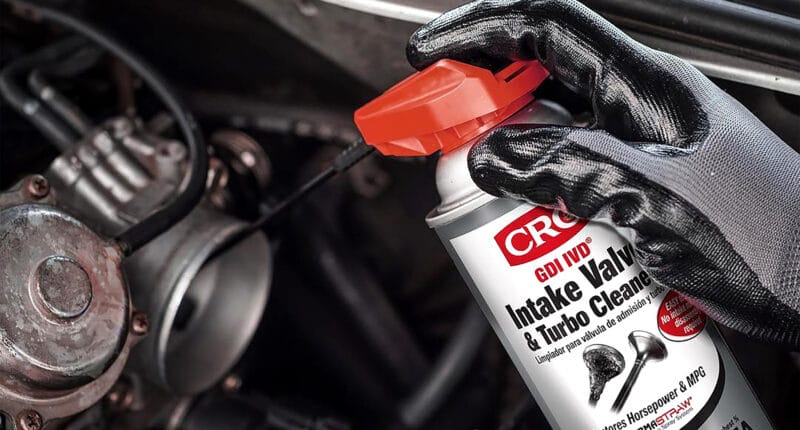

2 comments
I’m about to try either CRC or Wynn’s on my 2007 Mini Cooper S. I’ll post the results. Thanks for the breakdown.
CRC says you can also spare this cleaner into the inlet/intake hose, after rhe MAF sensor and before the turbo. So through the Turbo.